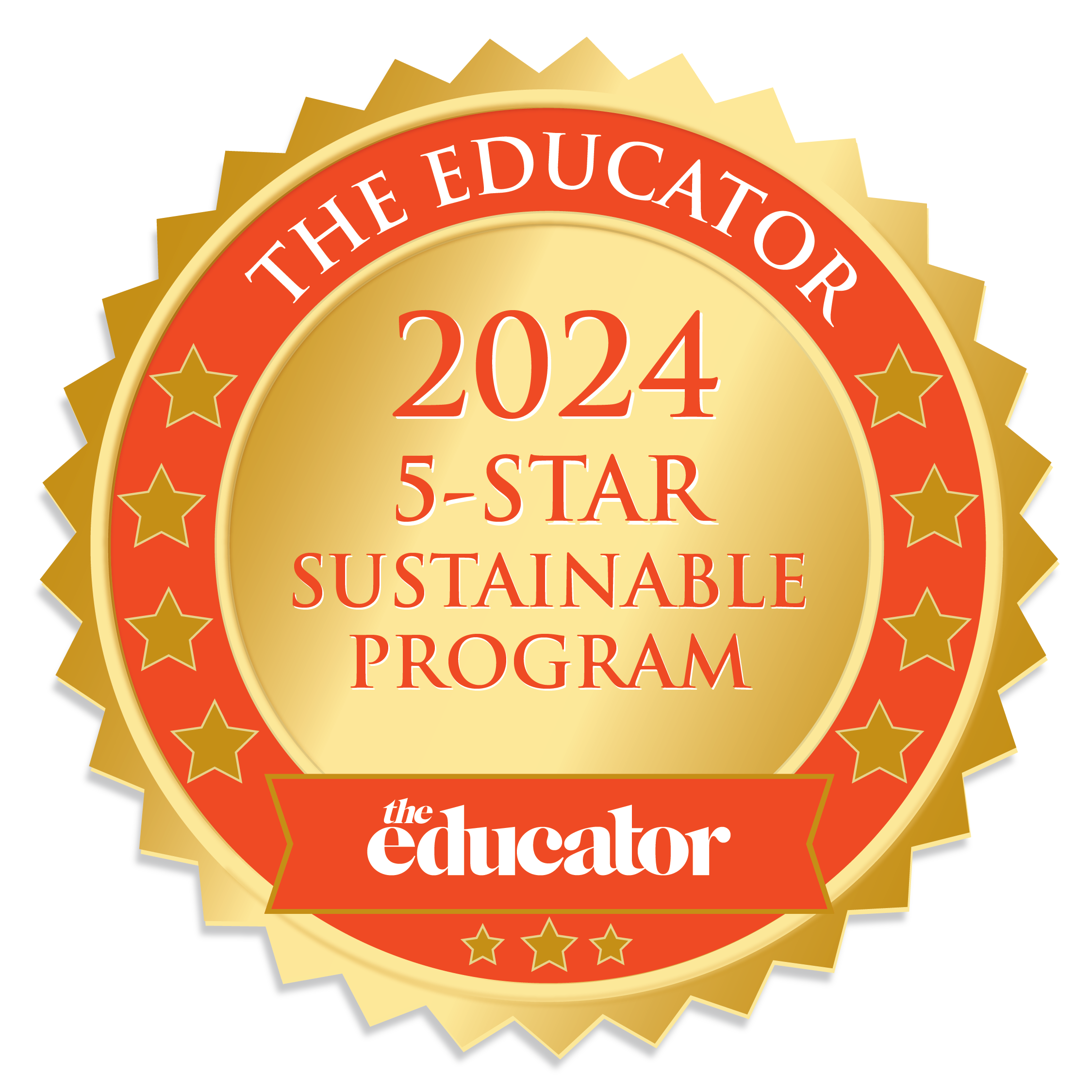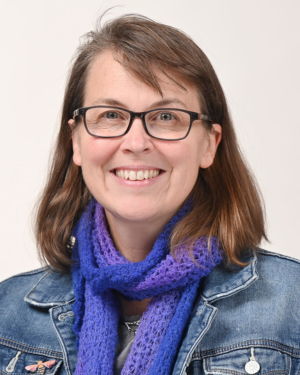- K/12
- Higher Education
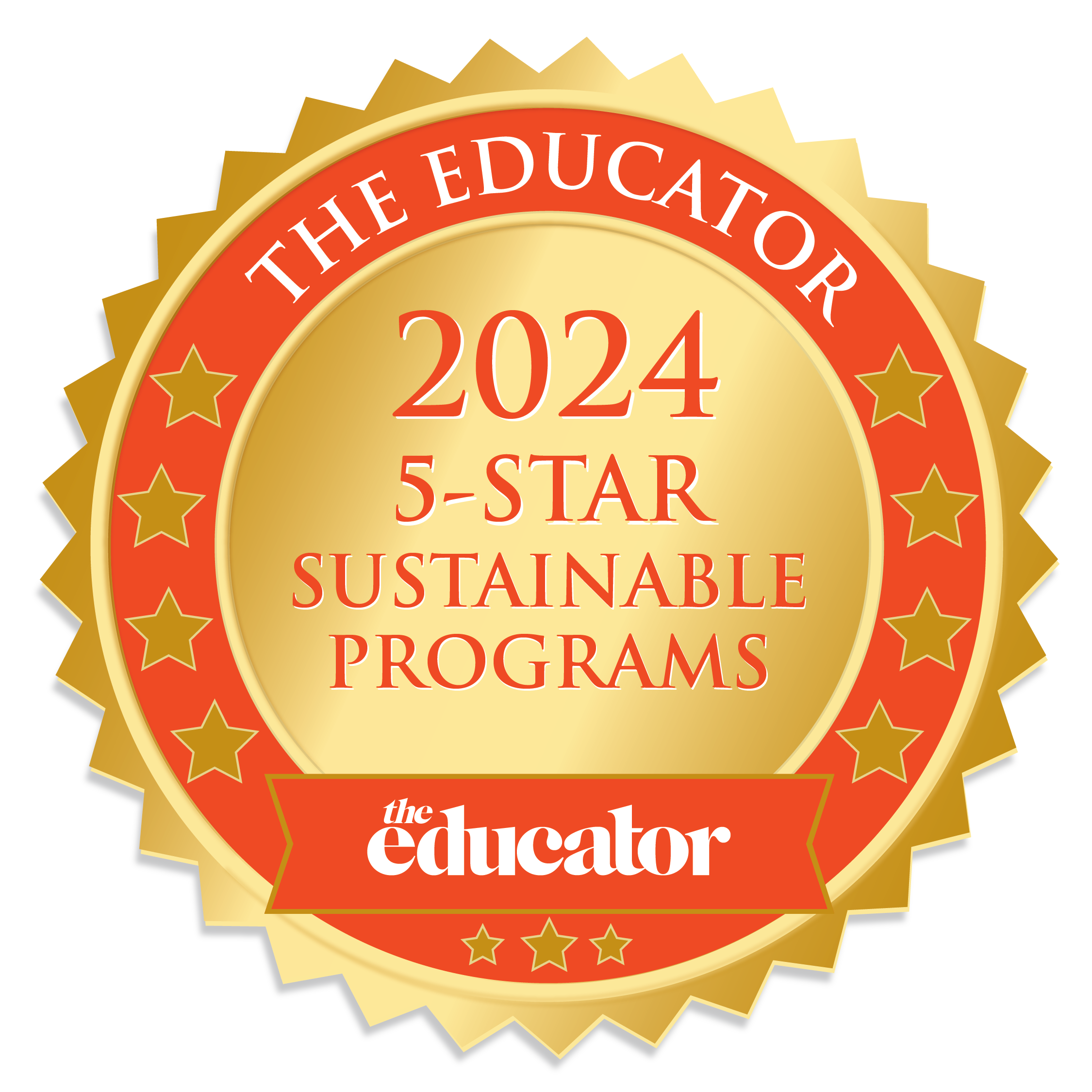
The Most Sustainable Schools in Australia |
5-Star Sustainable Programs
Jump to winners | Jump to methodology
Building a better future
Australia is the world’s 14th highest per capita CO2 emitter, ahead of both the US and China, contributing 1.06% of global emissions, which is greater than the UK and France.
Its climate has also warmed since national records began in 1910, with the average temperature increasing on average by 1.44 ± 0.24 °C, and every decade since 1950 has been warmer than the decade before.
Only five years ago, the country recorded its warmest year on record, 1.52 °C above average. And it’s not just a land issue, as oceans around Australia have warmed by around 1 °C since 1910.
This snapshot proves why sustainability is crucial for going forward for climate change and the environmental impact.
Peta White, associate professor in science and environmental education at Deakin University, says, “When we talk about sustainability, what we’re working for are ways that our societies can continue to thrive, and if we continue to use resources at the rates that we are, then thriving isn’t going to be possible for our communities and our species, but also for other species.”
The Educator’s 5-Star Sustainable Programs 2024 winners are a collection of forward-thinking and innovative schools, leading a movement to conserve natural resources and create a greener future.
This work is vitally important in education, as the latest national data shows 4,086,998 students were enrolled in 9,629 schools nationwide, meaning there is a huge potential impact to promote and implement sustainability in schools.
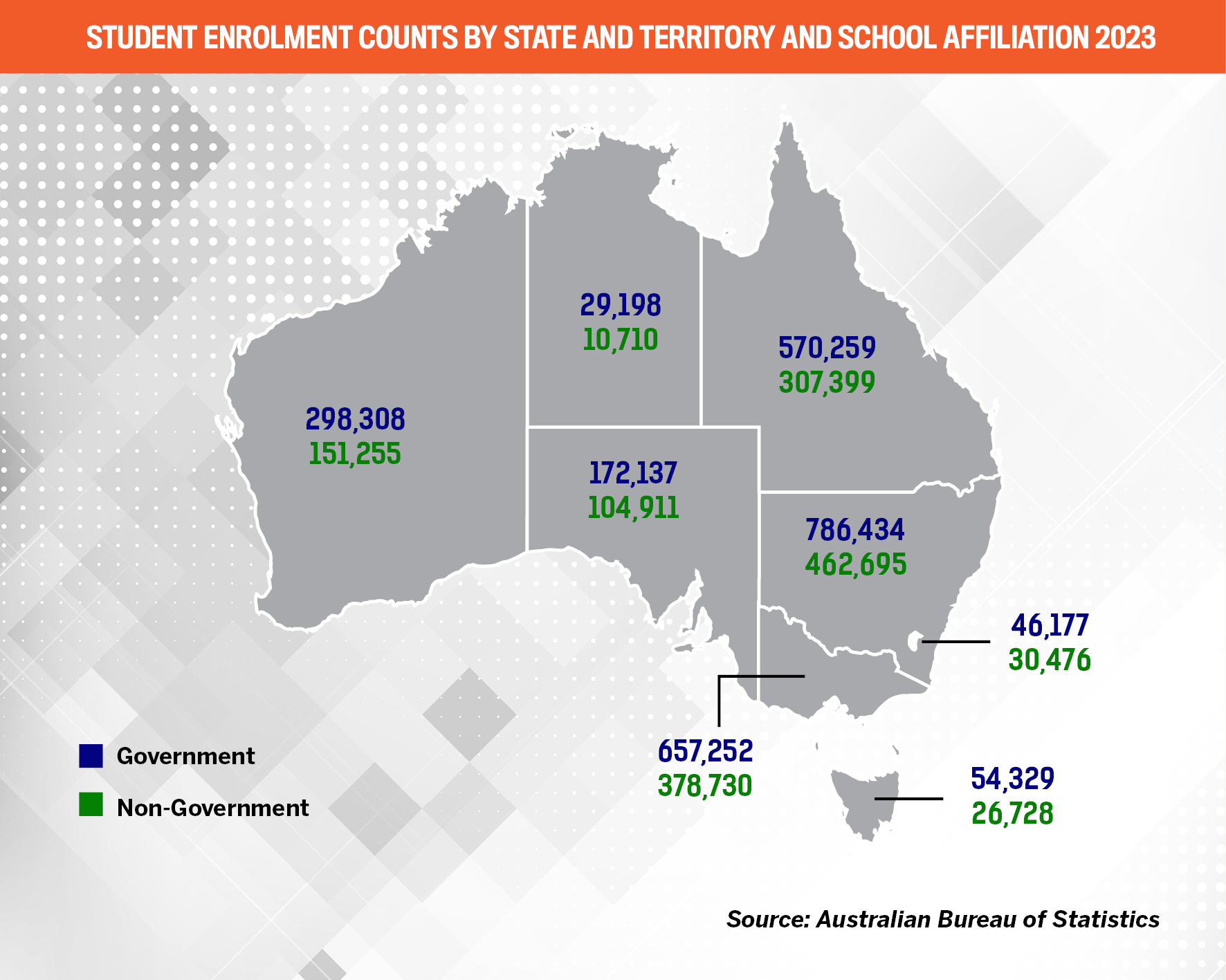
White explains, “If you consider that sustainability is how are we as a species determining our survival on this earth, then it’s the biggest issue, and right now I would use language such as climate change education and sustainability education to talk about the kinds of things that we need to be paying attention to.”
All of TE’s winners are at the forefront of sustainability and environmental education programs, something White feels is not done widely enough across Australia.
She says, “I don’t think a lot of schools are paying attention to the fact that they are a community and that the choices that they make in the community that impact the ecological systems are really important, and the criteria that a school might put around making those choices is equally important.
“We don’t want to be in a situation where the environment continues to subsidise all our choices around living and thriving. We need the environment to be prioritised so that our ecosystems and our earth systems are not disrupted because of human choice.”
This is the mandate and ethos all of the 5-Star Sustainable Programs 2024 winners have adopted.
Embedding sustainability
A feature of how TE’s winning schools have stood apart is their ability to make sustainability part of their culture.
It’s not treated as a side project or something akin to an after-school club.
Trinity Anglican School goes about this by role modelling.
Head of primary school, Peter Gazolla, grabs any chance he can to do some weeding or planting in the native garden.
He says, “They see the head of the junior school out there doing it, and they’ll all want to come and help me. It’s a small thing, but they see that it’s important to the teachers and the adults in their lives. Role modelling is important here at this school, and the kids see that it’s not tokenistic among the staff, that it’s actually important and valued.
“We even run some vertical groups, so groups of kids from Years 3 to 6 will go and do things, and that way the younger kids see the older ones doing it. It’s become just a natural part of our core value system, which is what schools need to be doing.”

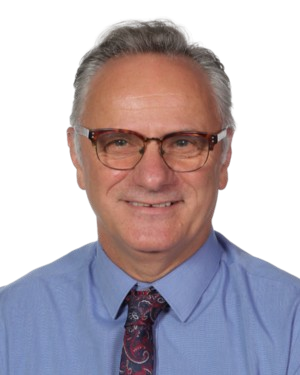
Peter GazollaTrinity Anglican School
Taking advantage of its spectacular location has enabled Sunshine Coast Grammar School to build its program successfully.
The school estimates that about 85-90% of the student body is involved in some level of sustainability, with the school committed to the UN’s 17 Sustainable Development Goals.
“It’s actually living the real thing, and it goes beyond the bounds of let’s go and plant a tree or do a beach cleanup. We do that and do it well, but it’s going beyond that,” says Ben Princehorn, coordinator of community services.
“It’s recognising that there’s a lot of layers to living a sustainable life. We talk about responsible consumption and about working towards zero poverty, supporting organisations overseas and within our own backyard. With the whole sustainability journey, we want students to know that those 17 sustainable development goals are achievable for them as young people.”

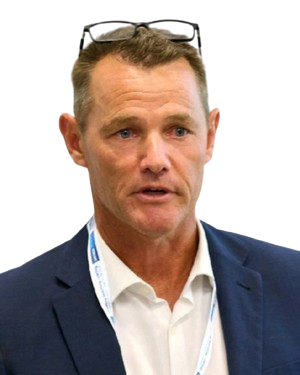
Ben PrincehornSunshine Coast Grammar School
The Hills Grammar School, in northwest Sydney, issues a challenge to its students and knows they can rise to the demands.
The school wants the kids to feel as if sustainability is something they can affect.
David Hamper says, “We’ve tried to create a sense that you are the change, and if you don’t actually engage with this, then it won’t get solved. People talk a lot about wicked problems, and a lot of environmental issues are genuinely wicked problems and seem hard to fix. It’s a bit of a cliche, but it does begin with that real individual, local level.”
As part of this, the school has begun an engagement with the University of Technology in Sydney, where a group of Year 10 students undertook a course in design thinking.
“From that, we pitched the idea that they had to come up with a single strategy that would help the school become carbon neutral by 2035, and some of their ideas were so impressive,” says Hamper.
There is also a group called Project Change that began by meeting and looking at platypus in the creek behind the school.
“We start to meet once a week just to raise awareness and start to look at things, but it was their dedication that brought upon Project Change, and we actually started doing something more to change things in our school. For me, it’s about our student dedication that drives me to want to do more and teach them more,” says Michaela Muller, acting head of design and innovation. “They are the ones that are keeping us going and doing the next things within our school.”

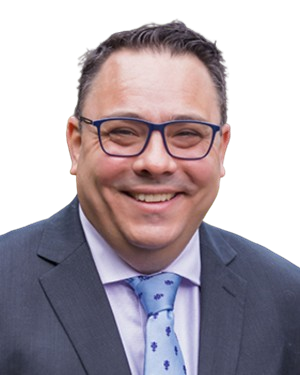
David HamperThe Hills Grammar School
Encouraging students is also the calling card at Matthew Flinders Anglican College, where a charter for the Flinders Farm has been developed according to holistic thinking principles.
Farm manager Jeff Maclennan says, “We encourage our students to go one step further than sustainability and embrace a mindset of regeneration. The underlying question for students is, ‘What can you do that will improve things for those who come after you?’ In short, each major decision has to meet social, ecological and financial criteria before being implemented.”
The kids at Flinders are provided with opportunities in the curriculum and through co-curricular activities.“Students learn about environmental sustainability, recycling, biodiversity, food sovereignty, composting and chemical-free agriculture through such programs and activities as our design thinking curriculum programs, environment club, farmer’s market, community service learning (such as local beach clean-ups) and cultural exchanges and conferences,” says Maclennan.
Key initiatives of 5-Star Sustainable Programs
Trinity Anglican School
-
comprehensive recycling program and composting system with a 75% reduction in waste sent to landfill
-
regular audits of the waste management system provide data on the volume of waste recycled and composted (received awards for exceeding expectations in the quantity of TerraCycle recycling for a primary school)
-
water tanks and implementing water-saving practices led to reduced water usage
-
better use of technology and using staff meeting time to share “TECH Tips” to reduce photocopying and printing
-
organic garden and native landscaping projects increased the number of plant species on campus by 30%
-
student participation has grown in caring for gardens, with waiting lists to join groups that participate in cocurricular activities involved with gardens
-
native plants propagated to be replanted and plants that encourage butterfly populations maintained and expanded each year
Sunshine Coast Grammar School
-
decade-long partnership with Clean Up Australia, helping remove over one tonne of rubbish from local beaches
-
eight recycling stations across the campus encourage students and staff to recycle hundreds of kilos each day, avoiding landfill
-
over the last 12 months, beach clean-ups netted over 100 kg of waste and saw over 120 students, staff and families come together for an annual event
-
actively engaged more than 800 students by providing fun days, lecture visits by prominent sustainability experts and opportunities to sign petitions and advocate for improved outcomes for wildlife and habitat locally, nationally and globally
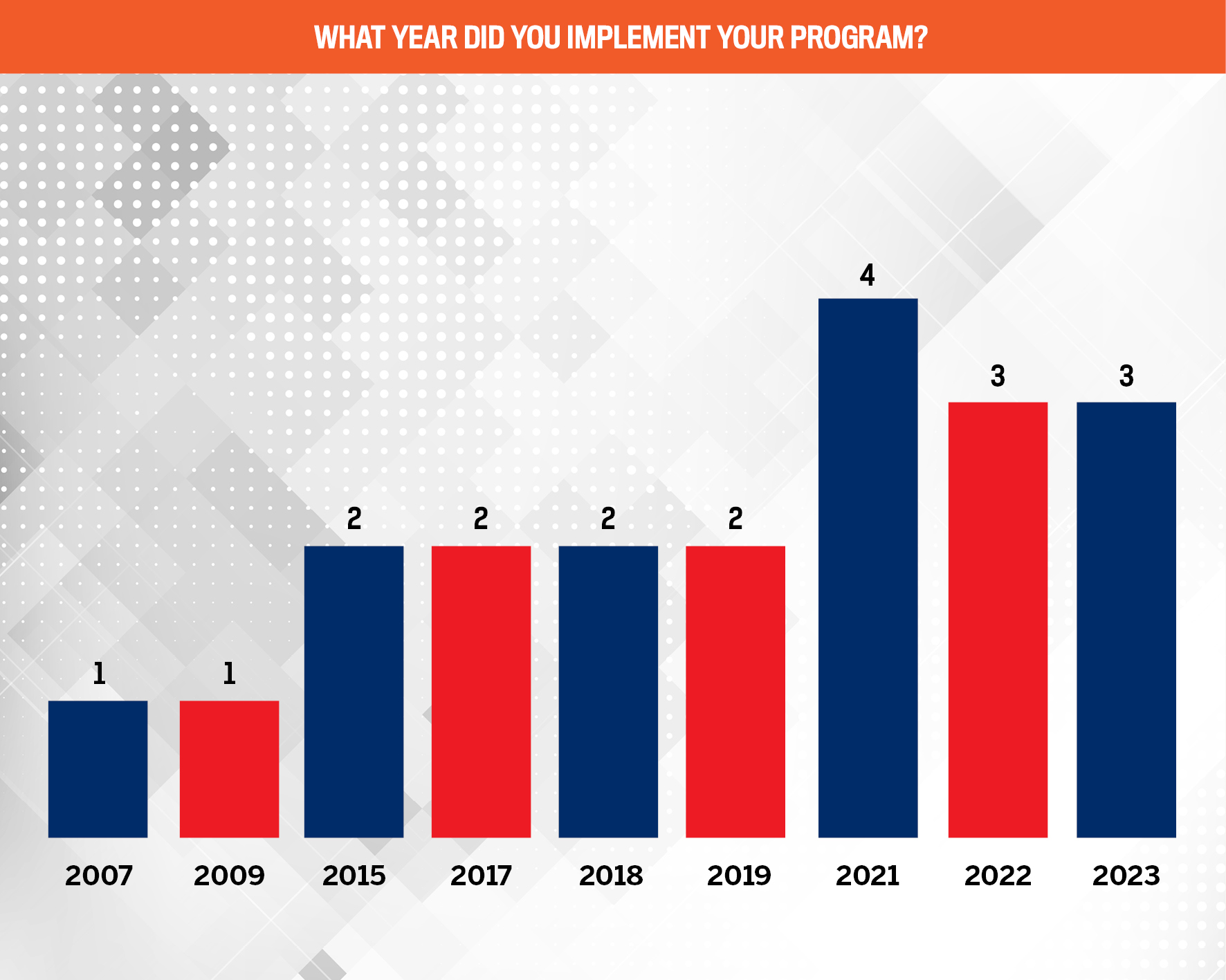
The Hills Grammar School
-
partnered with global One Planet Education Network on sustainable agriculture, climate change research and pollution mitigation as year 6-10 students conducted citizen science guided by international researchers
-
installed an ecosystem sensor network that measures CO2 emissions, air quality and the weather and monitors smoke from wildfires
-
forty-nine Year 10 students undertook a microcredential that would enable them to achieve six university credit points with the University of Technology and apply creative solutions to enable the school to reach net zero by 2030
-
strategic plan includes the intention to “commit to creating a rich and diverse learning environment at Hills that engages and inspires our students to be future-focused and connected authentically with the natural environment”
-
sustainable mission to enable students to become committed and agentic local and global citizens who have the knowledge and skills to become environmental stewards
Matthew Flinders Anglican College
-
Flinders Farm, with involvement by staff and students, achieved dramatic improvement in biodiversity and the associated resilience of its crops and animals
-
farm enterprises and innovations have grown to include its 900 m2 citrus orchard, 500 m2 of vegetable beds, 14 bee hives (11 European and 3 native bee hives), poultry for eggs, a compost-making facility and a biofertilizer-making facility
-
Year 9 program teaches students about regeneration through practical projects and innovative approaches, including making compost and compost teas from waste collected on campus, developing biofertilizers using a commercial worm farm, making biochar from green waste and exploring the use of animals (on a micro- and macro-level) to enhance soil carbon and species diversity through using cover crops
-
curriculum unit on First Nations agriculture practices explores how Indigenous people acknowledged themselves as part of the landscape, not separate from it
-
one of the college’s strategic commitments, noted in the Flinders Future (2023-2027), is to “Build a Sustainable Future”
Pushing the boundaries
Matthew Flinders Anglican College opened a state-of-the-art Infinity Centre in January 2024, built with industry-leading sustainability features to make Flinders one of the largest school solar installations across Australia.
The 1,784 solar panels provide more than 146 kW of power generation capacity, bringing the total capacity across the college campus to 642 kW. The solar generation per day is the equivalent of powering 95 average family homes per day.
Principal Michelle Carroll says, “Our students from Prep right through to Year 12 are learning they have an important part to play in acting responsibly and respectfully as we nurture and protect our planet for future generations.”

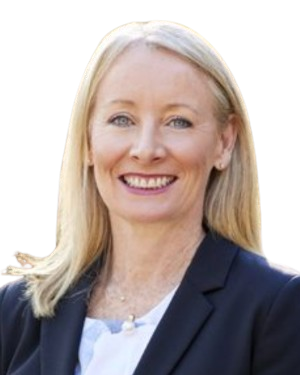
Michelle CarrollMatthew Flinders Anglican College
Students at the Sunshine Coast Grammar School are driving the school towards the UN Sustainable Development Goals.
A particular pair of Year 12s wanted to tackle the issue of fast fashion and arranged to run a clothing market that repurposes clothing.
“It’s just been really well received, and it’s small changes, but we know that those students will leave this place better humans, and they’ve educated our population; the over 1,400 students here are better for having that exposure,” says Princehorn. “We also look to repurpose our school uniforms as well as landfills, which is something we’re passionate about, as we have a responsibility to reduce waste.”
There’s also impressive grassroots efforts at Trinity Anglican School.
The kids collect the school’s vegetable scraps from lunches and put them in their compost bin, which then goes into the school garden. It helps grow vegetables, and the Grade 5 class makes pizzas using only toppings from the garden, sharing the food with the school.
And there’s also a gold, silver and bronze rewards system in operation.
“They can start early with grade three or four trying out for a bronze, and then by the time they get the grade six, they can go for gold, which means you really have to make some sort of visual impact and something that is long lasting,” says Gazolla.
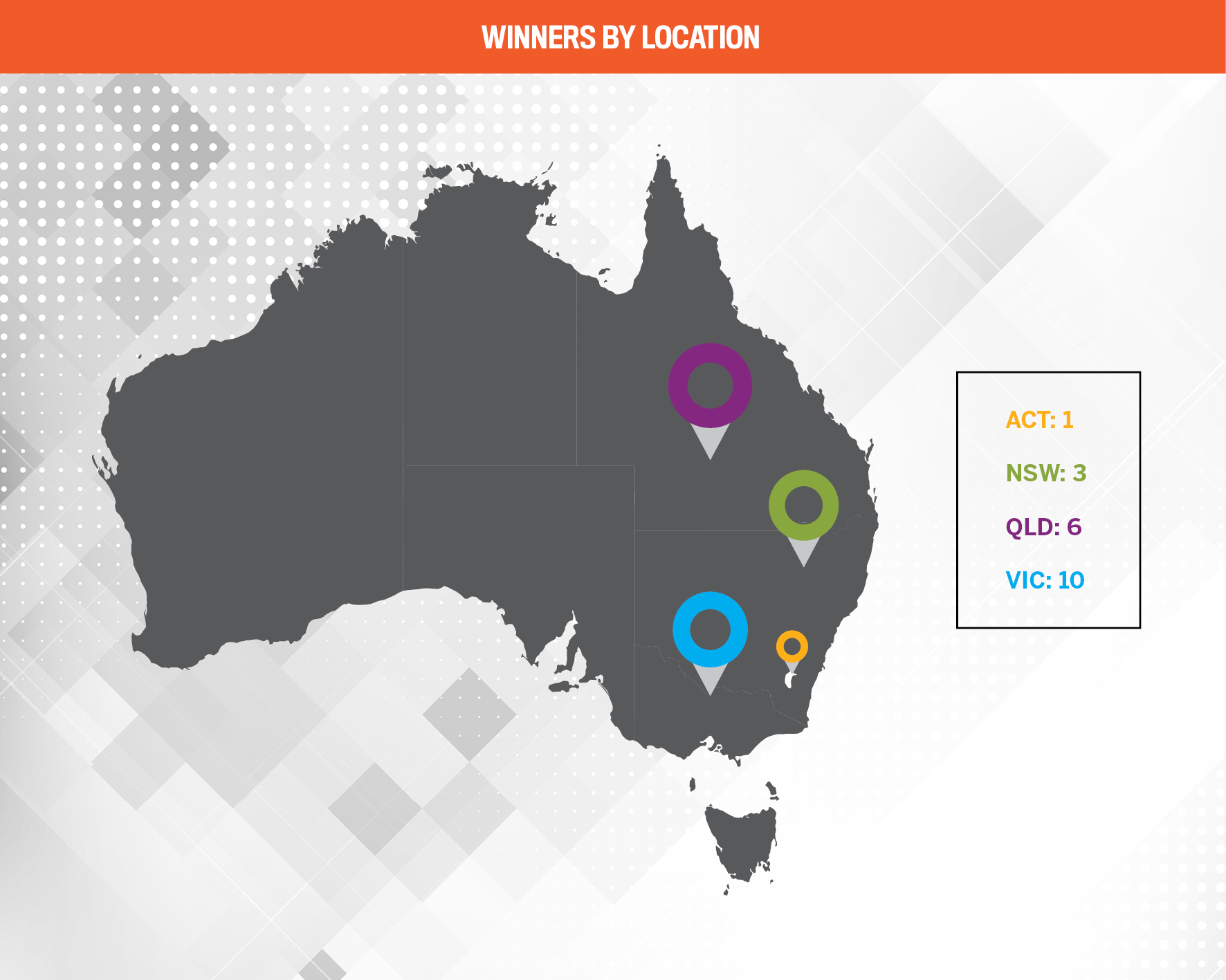
Efforts can range from recycling to outdoor initiatives.
Gazolla says, “We work with the local Indigenous people, and the elders told us this plant gives you food; this plant is for medicine and things like that. We keep embedding the idea of the environment and that we need to look after it.”
The Hills Grammar School has teamed up with One Planet Education Network, which also involves schools in Guam, Hawaii, the Philippines, India and other countries.
Students compare the carbon capture in the bushland part of their campus with the other areas closer to the roads and traffic.
“We share our data with kids in other parts of the world. One of the sites that kids are working in overseas has quite an active volcano near their school, and so their carbon emissions spike depending on what’s happening with the volcano. It’s that real classic citizen scientist kind of concept,” says Hamper.
In-house, the junior students analyse the data from the school’s sensors to understand what’s happening inside their building.
Muller feels that the young kids throw themselves into sustainability, and this has a compound impact.
“They work out all of these statistics, gathering them and then starting to put actions in place within the junior school. Their little initiatives actually start to make change,” she says. “Starting with a young mind that is growing means they will take it on more quickly than the senior school kids sometimes. They run with those ideas, and the passion they have is fantastic.”
The Australian Climate Change Education Summit and Action Plan brings together multiple education communities, including young people, teachers and educators, scientists, researchers, policymakers and activists, to set the climate change education action agenda for 2024 onwards.
The Most Sustainable Schools in Australia | 5-Star Sustainable Programs
- Al-Taqwa College
- Camberwell Grammar School
- Canberra Grammar School
- Chewton Primary School
- Corinda State High School
- John Paul College
- Lindisfarne Anglican Grammar School
- Mount Lilydale Mercy College
- Port Melbourne Primary School
- Queensland Academy for Science Mathematics and Technology
- Redlands School
- St Macartan’s Parish Primary School
- St Michael’s Grammar School
- St. Monica’s College
- Trinity Anglican School
- Victory Lutheran College
- Wandin North Primary School
Insights
Methodology
In June 2024, The Educator invited schools across Australia to participate in the publication’s second annual 5-Star Sustainable Programs awards. This report recognises the schools at the forefront of sustainability and environmental education programs. Entries were open to all educational professionals who believe their school is pioneering a new direction in education.
The Educator team objectively assessed each entry for detailed information, impact, metrics and true innovation – along with benchmarking against the other entries – to determine the 20 5-Star Sustainable Programs list.



